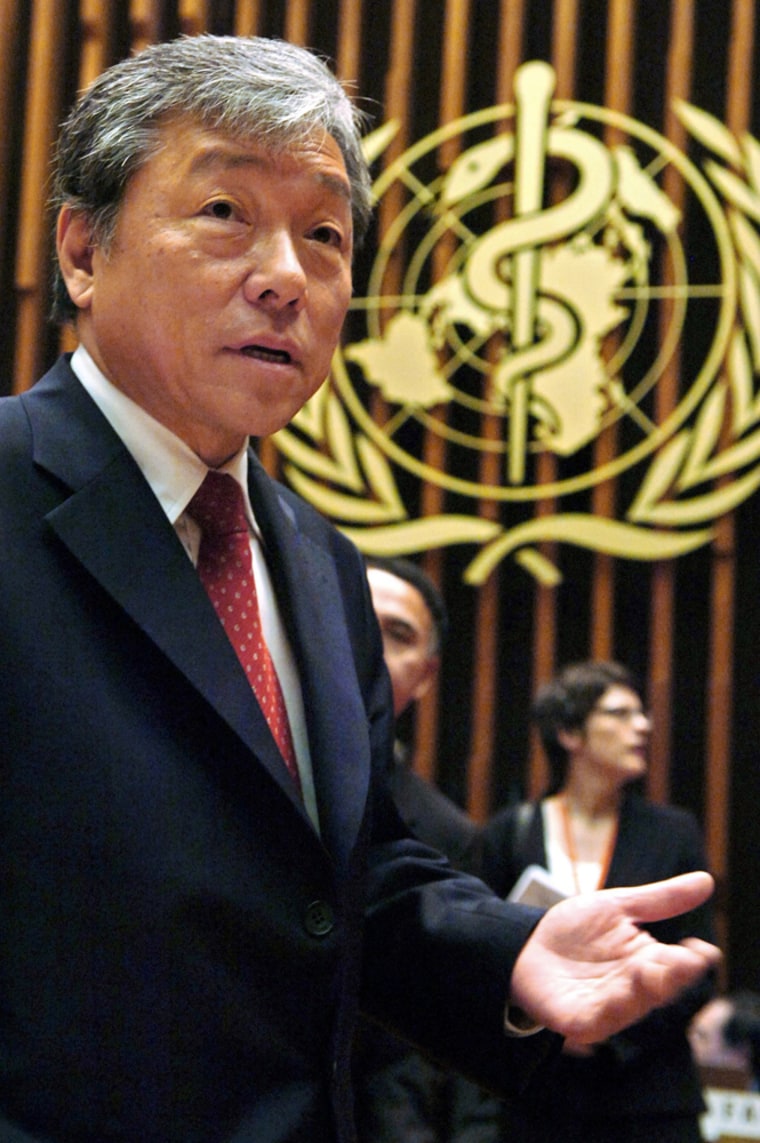Dr. Lee Jong-wook, who spearheaded the World Health Organization’s successive battles against SARS and bird flu and was the first South Korean to head a U.N. agency, died Monday. He was 61.
Lee fell ill Saturday afternoon while attending an official function in Geneva and underwent surgery later that day to remove a blood clot on his brain. He died Monday morning, WHO said in a statement.
Anders Nordstrom of Sweden, whom Lee had named to take over in an emergency, will serve as acting director-general.
“All of the staff of the World Health Organization extend their most sincere condolences to Dr. Lee’s family. The sudden loss of our leader, colleague and friend, is devastating,” the statement said.
Lee took over as director-general of WHO in 2003 as the agency battled the SARS outbreak in Asia. After that threat was contained, WHO turned its attention to bird flu amid fears the virus could mutate into a strain easily transmitted among people.
The agency oversaw a number of preparatory meetings as the experts sharpened their plans to tackle the H5N1 strain. WHO also built up a reserve of antiviral medicines and encouraged vaccine research.
At a global donors’ meeting in Beijing in January, $1.9 billion was pledged to the fight against bird flu and prepare for a potential pandemic.
U.N. in mourning
Lee worked for WHO for 23 years, including time served in regional posts. He was the first South Korean to head a U.N. agency, after winning praise for his low-key but efficient management style as head of the agency’s tuberculosis program.
Time magazine named Lee one of the world’s 100 most influential people in 2004.
U.N. Secretary-General Kofi Annan sent his “sincere condolences” to Lee’s family and WHO staff members, said Sergei Ordzhonikidze, head of U.N. offices in Geneva.
It is a “very sad bit of news,” Elena Salgado, Spain’s health minister and president of the World Health Assembly, said Monday at the opening of the annual meeting of the 192 members of WHO. Flags flew at half-staff on the U.N. building, where the meeting was taking place.
Lee “was an exceptional person and an exceptional director general,” Salgado said.
Lee initially said he wanted to improve international monitoring to help tackle outbreaks of diseases like SARS and that his mandate would be defined by the fight against HIV/AIDS, particularly in hardest-hit poorer countries.
High-profile challenges
But his time in office came to be dominated by the high-profile spread of bird flu through Asia, Europe and Africa and its potential for causing a human flu pandemic.
“We know another pandemic is inevitable,” Lee told a 2004 meeting of experts to discuss preparations for the emergence of a new strain of flu virus, expected to come from a change in the disease. “And when this happens, we also know that we are unlikely to have enough drugs, vaccines, health care workers and hospital capacity to cope in an ideal way. So we must act wisely.”
Lee was elected by WHO’s executive committee in January 2003 to replace Gro Harlem Brundtland, a former Norwegian prime minister who stepped down after successfully transforming WHO from a disillusioned and badly managed organization to a high-profile agency which has put health firmly on the global political agenda.
Lee, a tuberculosis expert, had previously run WHO’s Stop TB program.
He was the only WHO insider in the race for the top job in 2003 and the only candidate never to have held a ministerial or top U.N. post.
Although initially regarded as a political lightweight, he showed his acumen early on in the race by persuading 53 members of the U.S. Congress to write to Secretary of State Colin Powell and Tommy Thompson, the health secretary, backing his candidacy.
“I knew Dr. Lee for many years and had nothing but the highest admiration for his commitment to global public health,” said Dr. Shigeru Omi, WHO’s regional director for the Western Pacific. “He will be sorely missed.”
Lee is survived by his wife and son.
